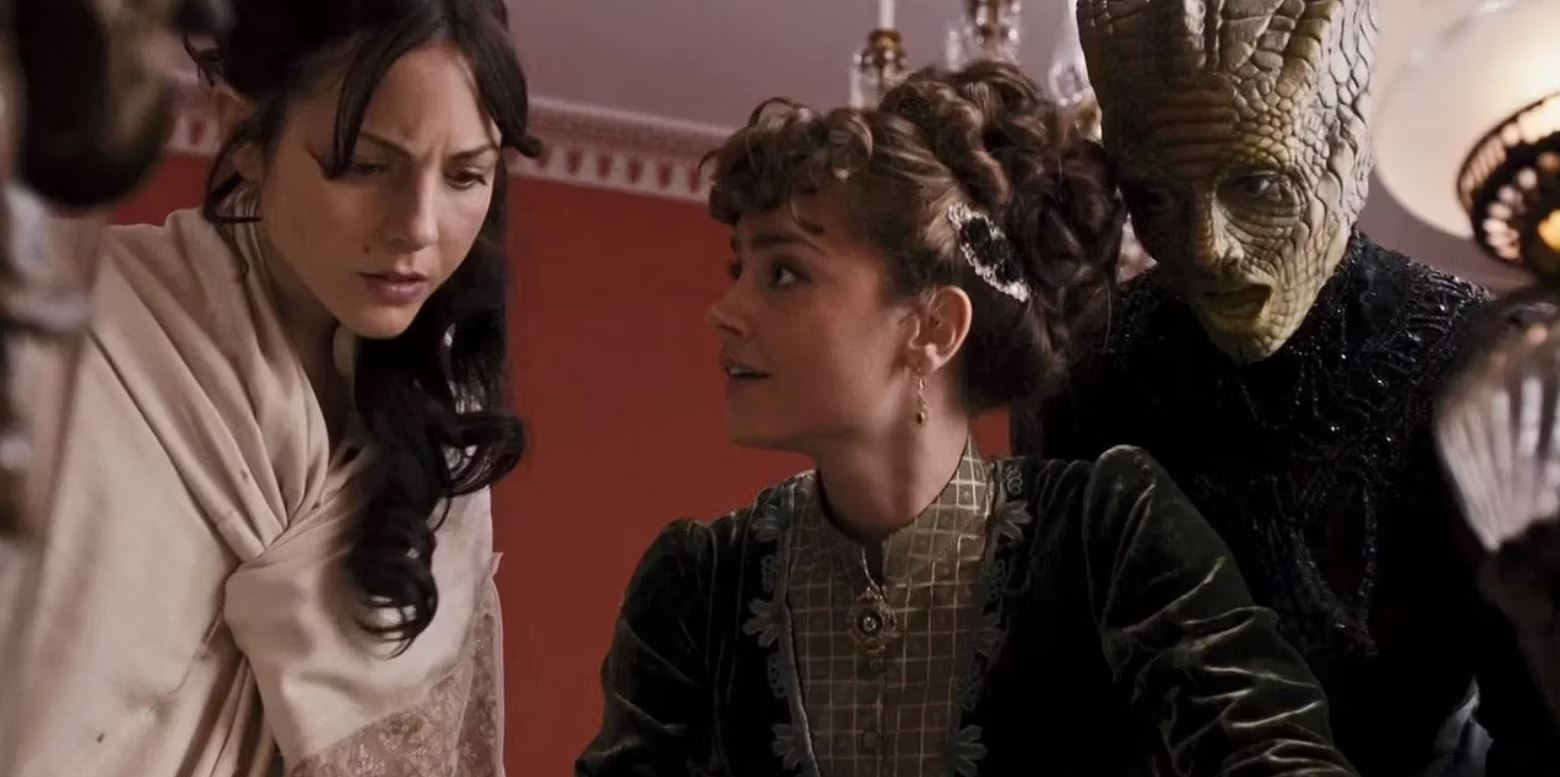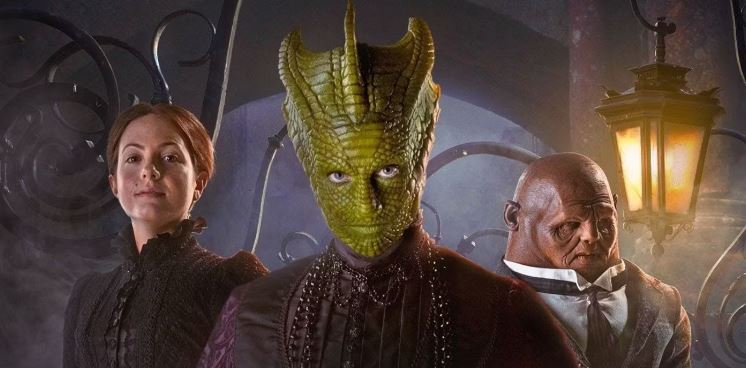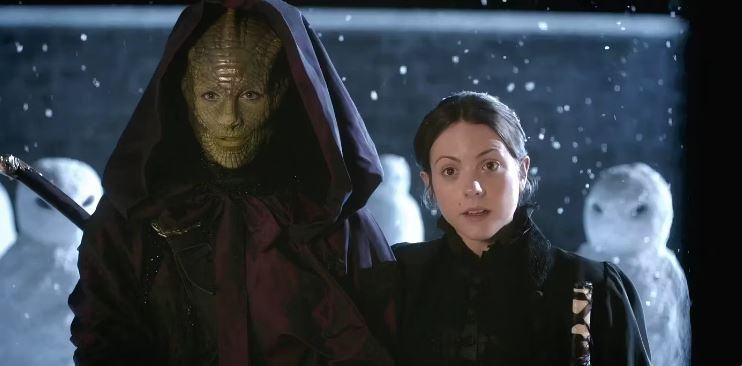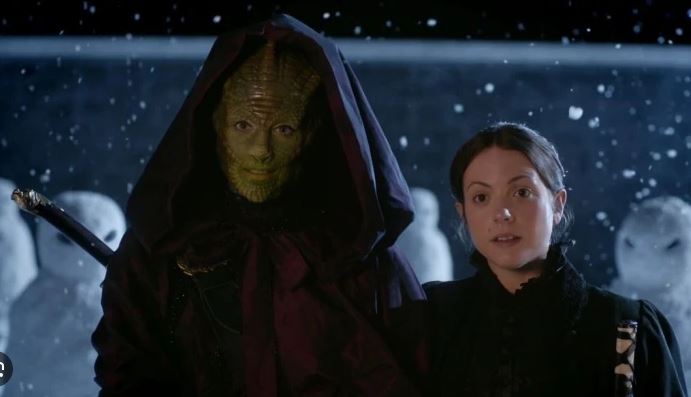A lot of hardcore Doctor Who fans could, if pressed, write a list of their top 200 favorite characters from the show. As its broadcast goes on into the distant future, every performer in the United Kingdom and beyond will eventually join the cast. There’s a very compelling Doctor Who episode idea in that statement. Imagine an organism that grows beyond the cosmos, transforming beings into other beings with complicated visual effects that just get better over the course of generations. For the time being, however, the show has names like Madame Vastra.
Doctor Who truly captures the entire spectrum of alien designs. They’ll bring the audience a towering version of the devil and a species of squid-faced humanoids in the same episode. The show’s most iconic creature is a little squid that pilots a trash can with a plunger and a whisk. The typical heroic character is vaguely human-like, usually with some form of rubber prosthesis or full-body grease paint. Fan favorites can stick around for generations, but the truly transcendent examples live on far beyond the show.
Where did Madame Vastra first appear?

Vastra first appeared in the 2011 Doctor Who episode “A Good Man Goes to War.” It’s a de facto finale for the sixth series’ first half. Vastra’s debut is far from the most important thing that happens in the episode, but she does get her first spotlight on the small screen. The episode unpacks a bit of her backstory, but most of it comes from books, games, and audio dramas. Vastra is a Sillurian, a reptilian humanoid species that inhabits Earth. They were once the dominant species on the planet, but conditions forced them to adapt or hide. They would hibernate for millions of years, leaving many of them trapped in their would-be sleeping pods. Vastra rose from the Earth in the 1880s. A team of workers accidentally disturbed her slumber while building an extension to the London Underground. Vastra reacted harshly, slaughtering innocent builders and commuters with her skills as a warrior. Only the Ninth Doctor could calm her down. After he talked her out of her rage, she peacefully integrated herself into Victorian London. Her life on the surface sharply improved when she met Jenny, a young match girl who she hired as a maid and eventually fell in love with.
Vastra joins the plot of Doctor Who as an ally of the Doctor. By the time of “A Good Man Goes to War,” she considered herself an old friend of his. The Doctor calls upon Vastra and Jenny to help him rescue Amy Pond and her infant daughter, Melody, from the Silence on Demons Run. Vastra brought an army of Sillurian Hunters with her to help the Doctor take over the enemy base. She would aid the Doctor again in “The Snowmen.” That episode saw Vastra work with Jenny and her new butler, Strax, as the Paternoster Gang. They help Clara find the Doctor, though she dies shortly thereafter. They have to reach out to the Doctor in “The Name of the Doctor,” which sees them taken hostage and altered. In the eighth season premiere, the Paternoster Gang tries to deal with a dinosaur in central London. That episode sees them bringing Clara into the gang until the Doctor comes back for her.
Who is Vastra in the Doctor Who extended universe?

While Vastra’s appearances in Doctor Who are few and far between, they often make reference to fascinating stories from her life. Many of those stories appear in books, games, and audio dramas. After the Doctor convinced Vastra to live among humanity, she became a member of polite Victorian society. The show suggests that the Doctor set her up with that lifestyle, but a comic depicts her rescuing the titular queen from an alien attack. Either way, she used her station to take on many jobs. She performed as a singer and entertainer before trying out bank robbery. After her very brief sojourn with crime, Vastra became a world-class detective. She was so good at solving mysteries that her life likely inspired the stories of Sherlock Holmes. Audio dramas, comics, and standalone novels cover the many mysteries she, Jenny, and Strax solved. She caught Jack the Ripper, but she also ate him, leaving behind no evidence and enshrining the killer in mystery forever. Vastra lived long into the 21st century. Unfortunately, her human wife, Jenny, did not. Vastra was last seen leading a support group for those who’d lost loved ones. Through a meeting, she found and rescued a pair of podcasters. She’s still going on strange little adventures, but Vastra was never the same after she lost Jenny to the ravages of time.
Could Vastra come back to Doctor Who?

Fans cried out for a spin-off series following the Paternoster Gang. Vastra, Jenny, and Strix enjoyed a long series of adventures through audio dramas, but they haven’t been on-screen since 2014. While nothing is impossible, it’s unlikely that they’ll return while the show’s in its current state. Steven Moffat, the showrunner who introduced Vastra, has long since stepped away. His predecessor, Russell T.
Davies, has since taken the reins again. While Davies loves callbacks, he hasn’t brought out many characters and concepts from the recent past. He seems to prefer much older references. That spin-off will probably never happen. Steven Moffat had the chance, but he didn’t take it. In an interview with Big Finish’s Vortex magazine, Moffat addressed the idea of a Paternoster Gang spin-off, saying:
We always thought that we might try and spin them off into something on television but I kept not wanting to fray the output: it’s quite good if Doctor Who is off the air sometimes!
While Vastra’s adventures with Jenny may never return to the small screen, fans can still explore a wealth of information from multiple mediums. Vastra is a fun and engaging character with a stunning life story. She lives a lot like the Doctor, switching professions and enjoying bizarre sidequests with every new stage of her life. Vastra may not have traveled as far as her Time Lord friend, but she found just about everything there is to do in her rebuilt home.
